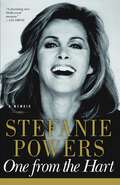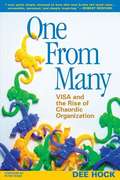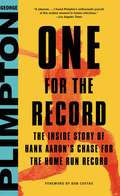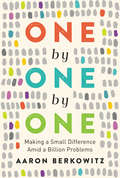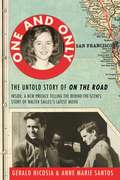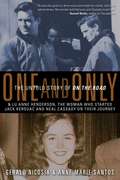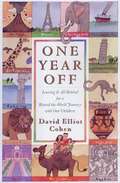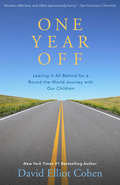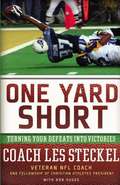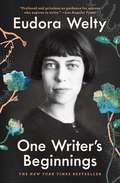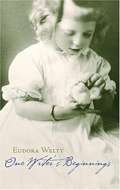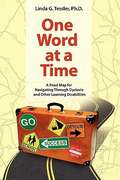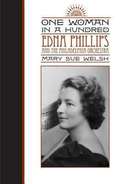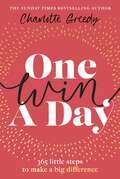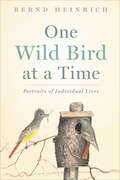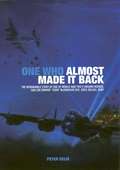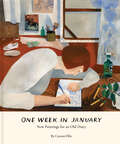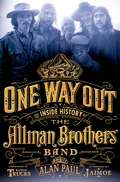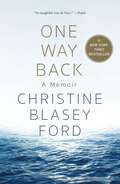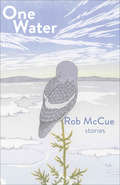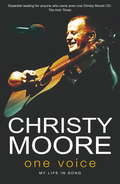- Table View
- List View
One from the Hart: A Memoir
by Stefanie PowersThe career of Stefanie Powers is one of so many stage, screen, and television credits that her name alone recalls memories as varied as her roles—on screen and off. From movie roles including John Wayne’s daughter in McLintock! and Lana Turner’s rival in Love Has Many Faces, to being terrorized by Tallulah Bankhead in Die, Die My Darling and befriending a Volkswagen in Herbie Rides Again, she stepped onto the television screen as the sexy secret agent April Dancer in The Girl from U.N.C.L.E. and the jet-setting, crime-solving wife of Robert Wagner in Hart to Hart. She is also an award-winning stage actress, fitness advocate, and an internationally recognized animal conservationist. A natural beauty groomed for show business at an early age, Stefanie Powers began her career at the tail end of the Studio System, a dynamic education in star quality and Hollywood history she happily admits was “one hell of a ride.” Privileged to have worked with some of the greatest names in the Hollywood firmament, Stefanie tells of the time she broke down in tears at a party over her divorce from actor Gary Lockwood, only to be comforted with a cocktail and the hard-won, been-there advice from two guests she had never met: Elizabeth Taylor and Ava Gardner. Costarring with Robert Wagner in Hart to Hart not only brought her five Emmy Award nominations but it created a working relationship that endured more than fifteen years. Through it all, Stefanie treasured the camaraderie of her close-knit community, and here she shares the priceless lessons she learned. But in a lifetime of dear friends and associates, no other had such a significant effect on Stefanie than one man: Oscar-winning actor William Holden. In One from the Hart, Stefanie reveals for the first time the extraordinary nine-year relationship they shared, a transcendent love story that ended with his tragic death as a result of lifelong struggles with alcoholism and depression. It was Holden, “a man of great fun, depth, and adventure,” who introduced to Stefanie a distinctive and enriching personal obsession in East Africa: the Mount Kenya Game Ranch. His work in the conservation and preservation of endangered species in East Africa began long before the issue became popular, and he pioneered the concept of a game ranch in Kenya. After his death, Powers established the William Holden Wildlife Foundation to carry on with his passion and his legacy to her. She built her own oasis on the foothills of Mount Kenya and lives part time in one of the most magnificent landscapes on Earth. This is One from the Hart, Stefanie Powers’s story of a resourceful, empowered, and atypical celebrity life, told with all the candor, wit, and wisdom that have come to embody the woman herself.
One from Many: VISA and the Rise of Chaordic Organization
by Dee HockIt is the story of an entrepreneur who created a new concept of organization, brought it into being, and led it to amazing success in less than a decade. Hock is a corporate statesman who continues to carry these ideas around the world.
One for the Record: The Inside Story of Hank Aaron's Chase for the Home Run Record
by Bob Costas George PlimptonThe inside story of Hank Aaron's chase for the home run record, repackaged and with a foreword by Bob Costas and new material from the Plimpton Archives.In ONE FOR THE RECORD, George Plimpton recounts Hank Aaron's thrilling race to become the new home run champion. Amidst media frenzy and death threats, Aaron sought to beat Babe Ruth's record. In 1974, he finally succeeded. A fascinating examination of the psychology of baseball players, ONE FOR THE RECORD gives an absorbing account of the men on the mound who had to face Aaron. But the book's true genius lies in the portrait of Aaron himself, and his discussions on his philosophy on hitting and the game of baseball.
One by One by One: Making a Small Difference Amid a Billion Problems
by Aaron BerkowitzIn the spirit of Tracy Kidder’s Mountains Beyond Mountains, and joining the ranks of works by Bryan Stevenson, Matthew Desmond, Abraham Verghese and Oliver Sachs, the inspiring story of a young American neurologist’s struggle to make a difference in Haiti by treating one patient—a story of social justice, clashing cultures, and what it means to treat strangers as members of our family.Dr. Aaron Berkowitz had just finished his neurology training when he was sent to Haiti on his first assignment with Partners In Health. There, he meets Janel, a 23-year-old man with the largest brain tumor Berkowitz or any of his neurosurgeon colleagues at Harvard Medical School have ever seen. Determined to live up to Partners In Health’s mission statement “to bring the benefits of modern medical science to those most in need,” Berkowitz tries to save Janel’s life by bringing him back to Boston for a 12-hour surgery. In One by One by One, Berkowitz traces what he learns and grapples with as a young doctor trying to bridge the gap between one of the world’s richest countries and one of the world’s poorest to make the first big save of his medical career.As Janel and Berkowitz travel back and forth between the high-tech neurosurgical operating rooms of Harvard’s hospitals and Janel’s dirt-floored hut in rural Haiti, they face countless heart-wrenching twists and turns. Janel remains comatose for months after his surgery. It’s not clear he will recover enough to return to Haiti and be able to survive there. So he goes for a second brain surgery, a third, a fourth. Berkowitz brings the reader to the front lines of global humanitarian work as he struggles to overcome the challenges that arise when well-meaning intentions give rise to unintended consequences, when cultures and belief systems clash, and when it’s not clear what the right thing to do is, let alone the right way to do it. One by One by One is a gripping account of the triumphs, tragedies, and confusing spaces in between as an idealistic young doctor learns the hard but necessary lessons of living by the Haitian proverb tout moun se moun—every person is a person.
One big happy family: 18 Writers Talk About Polyamory, Open Adoption, Mixed Marriage, Househusbandry, Single Motherhood, and Other Realities of Truly Modern Love
by Rebecca WalkerEdited by bestselling author Rebecca Walker, this anthology invites us to step into the center of a range of different domestic arrangements and take a good look around. From gay adoption to absentee fathers, from open marriages to green-card marriages, the reality of the American household has altered dramatically over the last three decades. With changing values and expectations, fluid gender roles, and a shifting economy, along with increase in infertility, adoption, and the incidence of mixed-race couples, people across the country are redefining the standard arrangement of family life. In a collection of eighteen honest, personal, and deeply affecting essays from an array of writers, One Big Happy Familyoffers a fresh look at how contemporary families are adapting to this altering reality. Each writing from the perspective of his or her own unique domestic arrangements and priorities, the authors of these essays explore topics like transracial adoption, bicultural marriage and children, cohousing, equal parenting, and the creation of virtual families. Dan Savage writes about the unexpected responsibilities of open adoption. Jenny Block tells of the pros and cons of her own open marriage. ZZ Packer explores the ramifications of, and her own self-consciousness about, having a mixed-race child. asha bandele writes of her decision to have a child with a man in prison for life. And Min Jin Lee points to the intimacy shared by a mother and her child's hired caregiver. All of these pieces smartly discuss the various cultural pressures, issues, and realities for families today, in a manner that is inviting and accessible. Sometimes humorous, sometimes moving, sometimes shocking, but always fascinating.
One and Only: The Untold Story of On the Road and LuAnne Henderson, the Woman Who Started Jack Kerouac and Neal Cassady on Their Journey
by Gerald NicosiaBeloved by both Jack Kerouac and Neal Cassady, Lu Anne Henderson has never told her story. Lu Anne was a beautiful 15-year-old girl in Denver in 1945 when she met Neal, a fast-talking hurricane of male sexuality. The two married, and soon they were hanging out with a group of young would-be writers, including Jack Kerouac and Allen Ginsberg. But Neal and Jack initially didn't like each other. Lu Anne ended up loving them both, and she taught them how to love each other -- giving Kerouac material for one of the seminal novels of the 20th century, On the Road. One and Only traces the immense struggles of Lu Anne's life, from the split-up of her family during the Great Depression to the ravages of abusive men and a late-life heroin addiction. It shows how her life intertwined with Jack's and Neal's to the very end.
One and Only: The Untold Story of On the Road
by Gerald NicosiaBeloved by both Jack Kerouac and Neal Cassady, Lu Anne Henderson's story has never been told. Lu Anne was a beautiful 15-year-old girl in Denver in 1945 when she met Neal, a fast-talking hurricane of male sexuality and vast promises. The two married, and soon they were hanging out with a group of would-be writers, including Jack Kerouac and Allen Ginsberg. But Neal and Jack initially didn't like each other very much. Lu Anne taught them how to love each other -- in effect, making the Beat Generation possible, as well as giving Kerouac material for one of the seminal novels of the 20th century, On the Road. One and Only traces the immense struggles of Lu Anne's own life, which ranged from the split-up of her family to the ravages of abusive men, lingering illness, and the grief of losing the two most important men in her life. Lu Anne Henderson did not live to see the filming of On the Road by Walter Salles, but One and Only tells how Twilight's Kristen Stewart, through her work with both Nicosia and Anne Marie Santos (Lu Anne's daughter), came to find the key to playing Lu Anne in the film.
One and Only
by Anne Marie Santos Gerald NicosiaBeloved by both Jack Kerouac and Neal Cassady, Lu Anne Henderson's story has never been told.Lu Anne was a beautiful 15-year-old girl in Denver in 1945 when she met Neal, a fast-talking hurricane of male sexuality and vast promises. The two married, and soon they were hanging out with a group of would-be writers, including Jack Kerouac and Allen Ginsberg. But Neal and Jack initially didn't like each other very much. Lu Anne taught them how to love each other - in effect, making the Beat Generation possible, as well as giving Kerouac material for one of the seminal novels of the 20th century, On the Road. One and Only traces the immense struggles of Lu Anne's own life, which ranged from the split-up of her family to the ravages of abusive men, lingering illness, and the grief of losing the two most important men in her life.Lu Anne Henderson did not live to see the filming of On the Road by Walter Salles, but One and Only tells how Twilight's Kristen Stewart, through her work with both Nicosia and Anne Marie Santos (Lu Anne's daughter), came to find the key to playing Lu Anne in the film.
One Year Off: Leaving it All Behind for a Round-the-world Journey with Our Children
by David Elliot Cohen[book Excerpt] In the end, I wrote twenty-three of these e-mail updates. They described our travels by airplane, ship, bus, car, van, train, camel cart, oxcart, and elephant howdah through sixteen countries on six continents. They recounted the times we got hopelessly lost in Rome and Cape Town, how we rushed our daughter to the emergency room in Bangkok, how we escaped a charging hippo in Botswana, how Kara nearly died in Australia, and how I stumbled upon a bit of enlightenment in a cave in rural Laos. They described what it was like to live out of a suitcase for more than a year and how we managed to coexist as a family in tight quarters twenty- four hours a day. As you read these adventures, anecdotes, and minor epiphanies, I hope you get the sense that these letters were sent to you, or better yet, that you traveled with us during our one amazing year off.
One Year Off
by David Elliot CohenHave you ever wanted to take a year off from your life? A meandering, serendipitous journey around the world with your family? It sounds impossible. But one day, David Elliot Cohen, co-creator of the bestselling Day in the Life and America 24/7 book series, decided to make this dream a reality. Over the course of six months, he and his wife sold their house, cars, and most of their possessions. He closed his business and pulled their three young children out of school. With only a suitcase, a backpack, and a passport per person, the Cohen family set off on a rollicking round-the-world journey filled with laugh-out-loud mishaps, heart-pounding adventures, and unforeseen epiphanies. In Botswana, the Cohens's tiny motorboat is charged by a hippo. In Zimbabwe, lions ambush a buffalo outside the family's tent. In Australia, their young daughter is caught in a riptide and nearly pulled out to sea. In One Year Off, you can join the family on a trek up a Costa Rican volcano, cruise the canals of Burgundy by houseboat, and ride ferries through the Greek Islands. Later, as the Cohens wander further off the tourist trail, you can drive through the villages of Rajasthan, traverse the vast Australian Nullarbor, and discover the charms of Cambodia's Angkor Wat and the hidden shangri-las of northern Laos. Over the course of these adventures, the Cohens learn to live as a family twenty-four hours a day, seven days a week and enjoy a once-in-a-lifetime opportunity to spend time together without the distractions of modern life. The author rediscovers the world through his children's eyes and gains new perspective of his own life. This humorous, heartfelt story is the next best thing to taking the trip yourself
One Yard Short: Turning Your Defeats into Victories
by Rob Suggs Les SteckelFrom the Publisher: For many of us, our lives are marked by missteps, disappointments, and hard times. And when we see those in the spotlight achieving success after success, we despair because our own lives don't seem to work out that way. Coach Les Steckel understands. One Yard Short is the amazing story of Les Steckel. A coach for 34 years, with 23 of those seasons coaching in the NFL, Steckel holds the dubious honor of being the most-fired coach in NFL history. And, unbelievably, most of the time's he was fired, he had experienced winning records with his teams. A lesser man would have given up and become bitter, but in the midst of each disappointment, each "failure," God was there, picking him up, dusting him off, telling Coach that He believed in him and that there was a special plan for his life. In One Yard Short, Coach Steckel teaches readers through his own life lessons and football experiences how to hear God's voice in the midst of disappointments and failures.
One Writer's Beginnings: A Curtain Of Green / The Wide Net / The Golden Apples / The Bride Of Innisfallen / Selected Essays / One Writer's Beginnings (The\william E. Massey Sr. Lectures In The History Of American Civilization Ser. #1)
by Eudora WeltyFeaturing a new introduction, this updated edition of the New York Times bestselling classic by Pulitzer Prize and National Book Award–winning author and one of the most revered figures in American letters is &“profound and priceless as guidance for anyone who aspires to write&” (Los Angeles Times).Born in 1909 in Jackson, Mississippi, Eudora Welty shares details of her upbringing that show us how her family and her surroundings contributed to the shaping not only of her personality but of her writing as well. Everyday sights, sounds, and objects resonate with the emotions of recollection: the striking clocks, the Victrola, her orphaned father&’s coverless little book saved since boyhood, the tall mountains of the West Virginia back country that became a metaphor for her mother&’s sturdy independence, Eudora&’s earliest box camera that suspended a moment forever and taught her that every feeling awaits a gesture. In her vivid descriptions of growing up in the South—of the interplay between black and white, between town and countryside, between dedicated schoolteachers and the children they taught—she recreates the vanished world of her youth with the same subtlety and insight that mark her fiction, capturing &“the mysterious transfiguring gift by which dream, memory, and experience become art&” (Los Angeles Times Book Review). Part memoir, part exploration of the seeds of creativity, this unique distillation of a writer&’s beginnings offers a rare glimpse into the Mississippi childhood that made Eudora Welty the acclaimed and important writer she would become.
One Writer's Beginnings (The William E. Massey Sr. Lectures in the History of American Civilization 1983)
by Eudora WeltyThe author tells the story of her early life and offers guidance for those who aspire to write fiction.
One Word to the Other
by Octavio PazLike Pequeña crónica de grandes días, One Word To The Other is also "a short chronicle," not of "grandes dias," not of "experiences," but of a life of reading and of "the search for others." Two persons with the name Octavio Paz are presented here. One is the poet, who exists only as "a fiction, a figure of speech." The other person is the "real person," "the first reader," the one who carefully edits and gives the poem its final form.
One Word at a Time: A Road Map for Navigating Through Dyslexia and Other Learning Disabilities
by Linda G. TesslerA unique and groundbreaking resource guide that is informative, insightful and inspiring, this book is Tessler's brave and honest account of her lifelong struggles with dyslexia. Culled from her experiences as a psychologist and scholar specializing in learning disabilities and as the parent of a son who struggles with dyslexia, she brings together sound psychological principles with personal knowledge.
One Woman in a Hundred: Edna Phillips and the Philadelphia Orchestra (Music in American Life)
by Mary Sue WelshGifted harpist Edna Phillips (1907–2003) joined the Philadelphia Orchestra in 1930, becoming not only that ensemble's first female member but also the first woman to hold a principal position in a major American orchestra. Plucked from the Curtis Institute of Music in the midst of her studies, Phillips was only twenty-three years old when Leopold Stokowski, one of the twentieth century's most innovative and controversial conductors, named her principal harpist. This candid, colorful account traces Phillips's journey through the competitive realm of Philadelphia's virtuoso players, where she survived--and thrived--thanks to her undeniable talent, determination, and lively humor. Drawing on extensive interviews with Phillips, her family, and colleagues as well as archival sources, One Woman in a Hundred chronicles the training, aspirations, setbacks, and successes of this pioneering woman musician. Mary Sue Welsh recounts numerous insider stories of rehearsal and performance with Stokowski and other renowned conductors of the period such as Arturo Toscanini, Fritz Reiner, Otto Klemperer, Sir Thomas Beecham, and Eugene Ormandy. She also depicts Phillips's interactions with fellow performers, the orchestra management, and her teacher, the wily and brilliant Carlos Salzedo. Blessed with a nimble wit, Phillips navigated a plethora of challenges, ranging from false conductors' cues to the advances of the debonair Stokowski and others. She remained with the orchestra through some of its most exciting years from 1930 to 1946 and was instrumental in fostering harp performance, commissioning many significant contributions to the literature. This portrait of Phillips's exceptional tenure with the Philadelphia Orchestra also reveals the behind-the-scenes life of a famous orchestra during a period in which Rachmaninoff declared it "the finest orchestra the world has ever heard." Through Phillips's perceptive eyes, readers will watch as Stokowski melds his musicians into a marvelously flexible ensemble; world-class performers reach great heights and make embarrassing flubs; Greta Garbo comes to Philadelphia to observe her lover Leopold Stokowski at work; and the orchestra encounters the novel experience of recording for Walt Disney's Fantasia. A colorful glimpse into a world-class orchestra at the height of its glory, One Woman in a Hundred tells the fascinating story of one woman brave enough and strong enough to overcome historic barriers and pursue her dreams.
One Win a Day: 365 little steps to make a big difference
by Charlotte GreedyFrom the Sunday Times bestselling author of You Do You, an interactive workbook designed to bring a bit more magic into your everyday life, one day at a time.You can start at any point of the year. Every page contains a simple act of self-care to take on each day, that will make today just that little bit better than yesterday. It's the best friend by your bedside - a safe space to help you take stock, take a moment for yourself, and then get ready to take on the world!Try your hand at self-care bingo one day. Get back to nature the next. Learn how to heal yourself using your love language. Practice celebrating your daily success, whether this is making your bed or finally catching up with that friend you've been meaning to chat to for ages.With Charlotte's signature humour and heart, this book is here to cheer you on through the ups and downs the year may bring, and take small steps towards happiness a little more each day.
One Wild Bird at a Time: Portraits of Individual Lives
by Bernd HeinrichUnique encounters with wild birds from the acclaimed scientist and &“a dedicated watcher happy to knock down the fourth wall of zoology&” (The Wall Street Journal). In his modern classics One Man&’s Owl and Mind of the Raven, Bernd Heinrich has written memorably about his relationships with wild ravens and a great horned owl. In One Wild Bird at a Time, Heinrich returns to his great love: close, day-to-day observations of individual wild birds. There are countless books on bird behavior, but Heinrich argues that some of the most amazing bird behaviors fall below the radar of what most birds do in aggregate. Heinrich&’s &“passionate observations [that] superbly mix memoir and science&” lead to fascinating questions—and sometimes startling discoveries (The New York Times Book Review). A great crested flycatcher, while bringing food to the young in their nest, is attacked by the other flycatcher nearby. Why? A pair of Northern flickers hammering their nest-hole into the side of Heinrich&’s cabin deliver the opportunity to observe the feeding competition between siblings, and to make a related discovery about nest-cleaning. One of a clutch of redstart warbler babies fledges out of the nest from twenty feet above the ground, and lands on the grass below. It can&’t fly. What will happen next? Heinrich &“looks closely, with his trademark &‘hands-and-knees science&’ at its most engaging, [delivering] what can only be called psychological marvels of knowing&” (The Boston Globe). &“An engaging memoir of the opportunities for doing scientific research without leaving one&’s own backyard.&”—Kirkus Reviews
One Who Almost Made It Back: The Remarkable Story of One of World War Two's Unsung Heroes, Sqn Ldr Edward 'Teddy' Blenkinsop, DFC, CDEG (Belge), RCAF
by Peter CelisThe little-known, real-life account of a Canadian hero&’s courage and loyalty in the face of Nazi Germany&’s greatest horrors during World War II. On the night of 27/28 April 1944, Teddy Blenkinsop and his crew were acting as deputy master bombers during a Pathfinder raid on Montzen in Belgium. After a successful attack, their Lancaster was shot down. Miraculously he survived to be protected by Belgian citizens before ending his days in Bergen Belsen concentration camp. Little was known of his exploits in between until Peter Celis, a Belgian air-force officer, began to research the story. What he uncovered is far more amazing than any fictional film could be. He found that Blenkinsop was not only an exceptional and gallant operational pilot, but that his loyalty, dedication and devotion were second to none and that his bravery and fearlessness led him to make the supreme sacrifice in the face of Nazi Germany. Written with pace and insight, this is an uplifting account of an outstanding young man who very nearly made it back home.
One Week in January: New Paintings for an Old Diary
by Carson Ellis“Feels like reading a love story that doesn't quite know it's a love story yet, and a success story that doesn't know it’s made it.” —Emma Straub, New York Times–bestselling author of This Time Tomorrow Award-winning, beloved children's book author and illustrator Carson Ellis makes a stunning adult debut with an illustrated memoir that evocatively captures a specific cultural moment of the early 2000s and in her journey as an artist. In January 2001, the young artist Carson Ellis moved into a warehouse in Portland, Oregon, with a group of fellow artists. For the first week she lived there, she kept a detailed diary full of dry observations, mordant wit, hijinks with friends (including her future husband, Decemberists frontman Colin Meloy), and turn-of-the-millennium cultural touchstones. Now, Ellis has richly illustrated this two-decade-old journal with extraordinary new paintings in the signature style that has made her an award-winning picture book author today. This beautiful volume offers a snapshot of a bygone era, a meticulous re-creation of quotidian frustrations and small, meaningful moments, and a meditation on what it means both to start your journey as an artist and to look back at that beginning many years later.AWARD-WINNING AUTHOR: Carson Ellis is a Caldecott award-winning author and artist known for her work in the Wildwood Chronicles, The Mysterious Benedict Society, and beyond and the longtime illustrator-in-residence for the band The Decemberists. People who love her children’s books will be thrilled to discover this new book—especially parents who are nostalgic for the days of the early 2000s. A NOSTALGIC GIFT: One Week in January is the perfect nostalgic gift for anyone who came of age in the heyday of indie rock, offering a glimpse into the lives of a particular Portland art scene. BEAUTIFUL, ECCENTRIC, AND CHARMING: Dry, specific, mundane, and somehow completely magical—this book is a true revelation. With gorgeous one-of-a-kind paintings by the one-and-only Carson Ellis, it’s transporting and relatable, an unglamorous homage to youthful misadventure, fun, sadness, and all the intense feelings of early adulthood.Perfect for: Fans of Carson Ellis’s picture books and illustration People who grew up listening to The Decemberists and other bands from the 90s Portland music scene Millennials and Gen Xers Readers of diaries and memoir Art book collectors
One Way Out: The Inside History Of The Allman Brothers Band
by Alan Paul Butch Trucks JaimoeNow an instant New York Times bestseller, One Way Out is the powerful biography of The Allman Brothers Band, an oral history written with the band's participation and filled with original, never-before-published interviews as well as personal letters and correspondence. This is the most in-depth look at a legendary American rock band that has meant so much to so many for so long. For twenty-five years, Alan Paul has covered and written about The Allman Brothers Band, conducting hundreds of interviews, riding the buses with them, attending rehearsals and countless shows. He has interviewed every living band member for this book as well as managers, roadies, and contemporaries, including: Gregg Allman, Dickey Betts, Jaimoe, Butch Trucks, Warren Haynes, Derek Trucks, Oteil Burbridge, the late Allen Woody, Jimmy Herring, Eric Clapton, Bob Weir, and many others. Tracking the band's career from their 1969 formation to today, One Way Out is filled with musical and cultural insights, riveting tales of sometimes violent personality conflicts and betrayals, drug and alcohol use, murder allegations and exoneration, tragic early deaths, road stories, and much more, including the most in-depth look at the acrimonious 2000 parting with founding guitarist Dickey Betts and behind-the-scenes information on the recording of At Fillmore East, Layla, Eat A Peach, Brothers and Sisters, and other classic albums.
One Way Back: A Memoir
by Christine Blasey FordNow a New York Times bestseller"A blisteringly personal memoir...a thoughtful exploration of what it feels like to become a main character in a major American reckoning." —The Washington Post"An insightful tour de force." —PeopleOn September 27, 2018, Christine Blasey Ford testified before the Senate Judiciary Committee which was considering the nomination of Judge Brett Kavanaugh to the United States Supreme Court. She described an alleged sexual assault by the Supreme Court nominee that took place at a high school party in the 1980s. Her words and courage on that day provided some of the most credible and unforgettable testimony our country has ever witnessed. In One Way Back, Ford recounts the months she spent trying to get information into the right hands without exposing herself and her family to dangerous backlash. Drawing parallels to her life as a surfer, she explains the process of paddling out into unknown waters despite the risks and fears, knowing there is only one way back to shore. The book reveals riveting new details about the leadup to her testimony and its overwhelming aftermath and describes how she continues to navigate her way out of the storm.This is the real story behind the headlines and the soundbites, a complex, page-turning memoir of a scientist, a surfer, a mother, a patriot and an unlikely whistleblower. Ford’s experience shows that when one person steps forward to speak truth to power, she adds to a collective whole, causing "a ripple that might one day become a wave.”
One Water: Stories
by Rob McCueA taxi driver seeks meaning in the Alaskan backcountry and through stories of the people in his cab in this thoughtful memoir of travel and nature.Rob McCue takes us on a journey from the mountains of Alaska to the streets of its second largest city in a quest to better understand whatever the heck is going on in this world. Along with anecdotes about his encounters with colorful characters and his many wilderness adventures, McCue provides fascinating and insightful descriptions of the geological, biological, and climactic circumstances that have shaped this great land.From Fairbanks to the Yukon River and beyond, McCue brings interior Alaska to life. Meanwhile, he explores his own transformation from a hedonistic young drifter to an adult who accepts his responsibility to his family and community.
One Voice
by Christy MooreChristy Moore is in every sense Ireland's folk hero. Mentor to a whole generation of Irish musicians, he holds a unique place in musical history. In l992 he broke all attendance records during 12 packed nights at the Point in Dublin. In the UK he fills concert halls around the country. In l997 he announced that he was taking an extended break from touring and recording. It was headline news in Ireland. So was his comeback which began in l999. Set to be an enormous best-seller, his autobiography marries both songs and memories. Around 250 of his favourite lyrics are accompanied by his memories around the song itself and his life. Each entry is fresh, direct, honest and spontaneous - like the most intimate diary. Through it he charts his life from drunk to sober, bar-room guitar player to international singer-songwriter.
One Voice
by Christy MooreChristy Moore is in every sense Ireland's folk hero. Mentor to a whole generation of Irish musicians, he holds a unique place in musical history. In l992 he broke all attendance records during 12 packed nights at the Point in Dublin. In the UK he fills concert halls around the country. In l997 he announced that he was taking an extended break from touring and recording. It was headline news in Ireland. So was his comeback which began in l999. Set to be an enormous best-seller, his autobiography marries both songs and memories. Around 250 of his favourite lyrics are accompanied by his memories around the song itself and his life. Each entry is fresh, direct, honest and spontaneous - like the most intimate diary. Through it he charts his life from drunk to sober, bar-room guitar player to international singer-songwriter.
